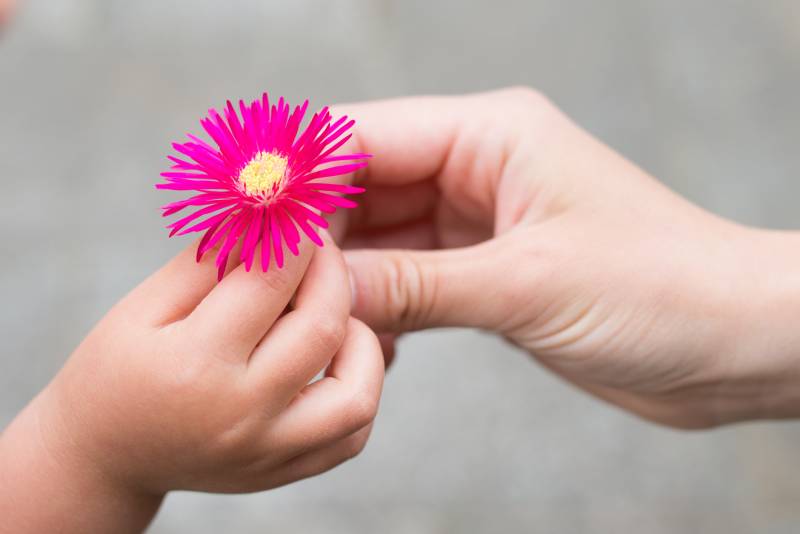Research points to the efficacy of a disciplinary approach known as induction, in which caregivers explain how children’s actions affect other people. As Moyer explains, it’s the difference between saying, “Don’t hit” and saying “Hitting isn’t okay because it hurts your brother, and that’s why he’s sad right now”; or between “pick up your Legos” and “Please pick up your Legos because otherwise I’m going to step on one and it’s really going to hurt.”
When parents and teachers simply say “don’t do that,” we miss an opportunity to help kids connect the dots. “Why are we asking them to stop? When we take the extra beat and link what they have done, or not done, with how it affects you or another person, it really helps them understand the rationale for your request,” said Moyer.
In fact, according to studies Moyer cites, children whose parents use induction as a form of discipline are more generous and empathetic than children whose parents use power-assertive strategies such as punishments.
The Chores-Kindness Connection
Many parents will be pleased to learn that engaging in chores doesn’t just build useful skills – it also builds kindness. “There is a strong link between doing things that are good for the whole family and the development of generous behavior,” said Moyer. “When I ask my kids to help clear the table, I might say, ‘This is really helping me and dad out because we have a lot going on. You're making our house look nicer, and you're making it so that we have clean dishes for breakfast tomorrow. So it's really helpful for the entire family."
While adults may feel that statements like this are pointing out the obvious, we have to remember that kids are at different stages of their development – and that kindness is a character trait that takes both practice and intellectual understanding. “Sometimes, as parents, we expect and assume that our kids understand things that we haven’t made explicit,” said Moyer.
Additionally, speaking to children about their influence on the family is a sign of respect. According to Moyer, it tells them, “You really matter. What you do really affects others. Your actions are powerful and can be used in very, very good ways.”
Kindness, Bullying, and Upstanding
When parents regularly talk with kids about what kindness looks like and how their actions affect others, they raise kids who are less likely to bully and more likely to stand up for others.
Parents often underestimate their child’s capacity to be mean. For example, in one study out of the University of New Hampshire, 31 percent of fifth graders admitted to teasing or picking on other kids. But only 11 percent of parents believed their child engaged in such activity – including only two percent of the parents whose children admitted to teasing.
“There’s this bias in the way we perceive our kids,” said Moyer, “We are always worried about what other kids are going to do to our kids, rather than what our kids might do to other kids.”
It’s helpful for parents and educators to recognize that bullying is a continuum and that a child’s role may vary from day to day – from aggressor, to bystander, to target. Even the kindest child might laugh along to a mean joke one day. This grey area highlights the need for clear, open conversations about what bullying is, the many forms it takes, and why it’s not okay for them to engage in this behavior. “We assume that kids know what bullying is and what it looks like, but the research suggests that there are lots of kids who just don’t get how teasing someone makes that person feel.”
Of course, raising kids who don’t bully is a minimum standard. We also want to help our children be the type of people who stand up for others. According to one study, fourth and fifth graders whose parents gave them clear advice about what to do when they witnessed bullying were much more likely than other kids to reach out and support bullying victims. “Kids do actually listen to their parents,” said Moyer. “Having these conversations changes how our kids behave and the choices they make at school.”
So what should our kids do if they see another child being picked on? Teach them to reach out with kindness to targets – to sit with them at lunch, invite them to play at recess, or even just stand near them in a warm manner. In surveys, children who have been bullied report that “the most helpful thing that other kids did after they've been bullied was to listen to them and to spend time with them,” said Moyer. “If your child feels courageous enough to say something to the bully, that's great. But if they don't, there's still so much they can do to be supportive.”
Finally, Moyer reminds parents that children are incredible observers of adult behavior. “Your kids are watching what you're doing. They're watching how you interact with your friends and how you talk about and treat your partner.” When you do make a mistake or say something unkind – as we all do at times – that can also be a teachable moment.


